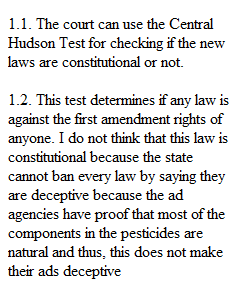


Q Hi all, Please post your responses to these questions that explore the material in chapter 15. Use your textbook as a reference. Problem Questions 1. The state of California adopts a law banning advertising for all pesticides. The statute is immediately challenged by pesticide makers. The state argues that the use of such products by homeowners and others is causing a serious pollution problem in the state’s streams and rivers and that it is killing fish and other marine species. State biologists have produced a report that proves that nearly 30 percent of all fish killed in rivers and streams die from pesticide poisoning. While the state cannot ban the use of the chemicals, it argues that if the pesticides are not advertised, then the sale of pesticides will surely drop substantially. This will help the water pollution problem. Pesticide makers admit that the runoff of chemical pesticides does cause a problem in some streams and rivers, but they argue that most pesticides (55 percent) sold today are not harmful to anyone, including fish. 30 percent of all pesticides sold are not even made from chemicals, but they are produced from natural substances. Finally, they say that the state has not produced any studies to show that a ban on advertising will reduce the use of pesticides. “In other states where this was tried, the sale of the pesticides remained unchanged,” they said. Pesticide makers argue that the law violates the First Amendment. 1. Outline the test that the court will use to evaluate whether or not this new law is constitutional. 1. Apply this test to the pesticide law, and determine whether the state could constitutionally ban the advertising of all pesticides. 2. You are the attorney for a company that wants to produce a new magazine called “MAXIM-UM-SKIN.” The magazine is not obscene under the legal definition of obscenity (Chapter 13), but it does have some sexual content and nudity. The owner of the company wants to send e-mails about the magazine to people who have neither asked for the magazine nor who have requested an e-mail about it. Put differently, the owner wants to send mass quantities of spam e-mails asking people to subscribe to the start-up’s publication because spam is a very cheap and potentially effective way of doing business. As the company’s attorney, what do you advise your client about what to include in spam e-mails? 3. A company called Skinny, Inc. runs a television (TV) ad boasting that its new diet cola, “Diet Fever,” is the “best tasting diet drink on the market” and that “Diet Fever will allow you to lose 20 pounds in two weeks while lowering your blood-sugar count.” A rival company called Know Phat, which makes its own diet drink, disputes both the assertions made by Skinny, Inc. and asks the FTC to investigate the claims made in the “Diet Fever” ad. 1. Will Skinny, Inc. be allowed by the FTC to continue to call “Diet Fever” the “best tasting diet drink on the market”? Explain. 1. Will Skinny, Inc. be allowed by the FTC to continue to state that “Diet Fever will allow you to lose 20 pounds in two weeks while lowering your blood-sugar count”? Explain.
View Related Questions